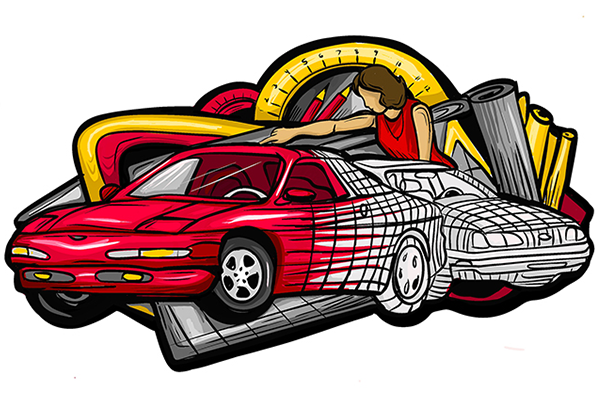Let's say you just finished your regularly scheduled motor oil change and dropped your used oil off at your local Advance Auto Parts store. That's fantastic, but what about your used oil filter? What about other fluids or even your used auto parts? The ones that you know shouldn't go in the trash? Yes, those parts! Did you know that Advance Auto Parts accepts everything from batteries to differential oil for recycling?
Let us help you dispose of your motor oil with this helpful list to identify what else you can drop off and how our oil recycling program works.
Motor Oil Recycling

Source | Advance Auto Parts
Modern motor oil is a miracle of science, providing engine lubrication but also secondary roles with engine cooling, cleaning out buildup and delivering anti-corrosion agents throughout the engine interior. So when it's time to change your oil, don't throw away all that awesome liquid. Instead, take it to your local Advance Auto Parts Store for drop-off.
The process of recycling used motor oil usually looks like this:
- Collection and storage - Used motor oil is collected from Advance Auto Parts, oil change shops, auto mechanics, dealerships and other sources. This mix of oil brands, types and weights is generally stored in drums until it is ready to be processed.
- Pre-treatment - Before the used oil can be re-refined, it must be pre-treated to remove contaminants such as water, dirt and metal particles. This is done using a series of filters and settling tanks.
- Distillation - The pre-treated oil is then heated to separate the different components of the oil, separating the base oil from the additives. The base oil is the primary product of the distillation process, making up roughly 80% of the used oil.
- Hydrotreating - The base oil is treated with hydrogen under high pressure and temperature to remove any remaining contaminants and improve its performance characteristics.
- Blending - The final step is to blend the re-refined base oil with new additives to produce a finished lubricant product that meets or exceeds industry specifications.
There are many other reasons to finish your oil change the right way.
Proper motor oil disposal matters:
- Environmental protection - Used motor oil is classified as hazardous waste due to ingredients like benzene and sulfur and can harm the environment if not disposed of properly. If not recycled, it may end up in landfills or be illegally dumped, leading to soil and water pollution.
- Conservation of resources - Recycling used motor oil reduces the need for new sources of crude oil. Used motor oil doesn't wear out. It can be re-refined and used repeatedly, reducing the need for extracting new oil from the ground.
- Energy savings - Recycling used motor oil requires less energy than refining crude oil to produce new oil. The EPA reports that the five-quart jug you grab off the shelf needed 84 gallons of new crude oil to make, but the same amount of motor oil can be made from just two gallons of recycled oil. Recycling used oil can help to reduce overall energy consumption.
- Cost savings - Recycling used motor oil can be less expensive for the manufacturer than buying new oil. Re-refined oil is often less expensive than new oil, and recycling used oil can also reduce the company's waste disposal costs. This means lower oil prices for all of us.
Oil Filter Recycling

Source | Advance Auto Parts
If you only recycle the motor oil after an oil change, that's a job only half complete. Your used-up oil filter also contains contaminants that shouldn't go into landfills. If you've ever walked through a salvage yard, you know recycled car parts have value to classic vehicle owners looking for out-of-production car parts. While no one is shopping for used oil filters for their ride, these seemingly used-up parts still have a cash value as scrap. Recyclers want oil filters as they are made of steel and catch metal contaminants in the oil, such as aluminum and copper, and some oil filters have neodymium rare earth magnets that are worth a bit more.
Recycling oil filters isn't quite as involved as recycling motor oil. It typically involves crushing or shredding the filters to break them down into separate materials. The metal is then melted down and recycled, while the paper fibers can be reused in a variety of applications, such as insulation or packaging materials. Any used oil still in the filters can be collected and go through the recycling process above.
The big takeaway with oil filter recycling is to simply drop off both the oil and the filter at the same time, and have both problems off your hands.
Pro Tip: Use the jug of oil to return your used oil and the oil filter box to return the used filter.
Gear Oil Recycling
Manual transmission and differential gear oil is a heavy-duty grade of oil that can stand up to mechanical shocks. Like your motor oil, you should be changing your manual transmission and differential gear oil on time. Also, like your motor oil, that smelly used gear oil can – and should – be recycled. Gear oil is notoriously smelly due to its high sulfur content. That's one of the main reasons it should be recycled, as improper disposal can pollute groundwater, and burning it can lead to breathing problems. Gear oil is recycled very similarly to the motor oil above, and your easy part is just dropping it off at Advance.
Battery Recycling
Even a used low-voltage battery has a cash value. Bonus points for recycling DieHard batteries, as they have a certified circular economy. Automotive batteries should be recycled due to plastic which takes hundreds of years to decompose naturally, as well as lead and battery acid that can pollute the soil. These potential downsides are also why the battery can be recycled. Plastic is easily and cheaply recycled, and the lead in new batteries averages 80% recycled material. In addition, any steel, aluminum, copper, or cobalt in a 12V battery can be recycled.
Used battery disposal is simple, and you can even get a $10 Advance gift card for your effort.
It's important to note that the above only applies to automotive, golf cart, and marine batteries. Unusual battery types, such as lithium-ion hybrid batteries, are excluded.
Coolant Recycling

Source | Kenneth Cheun
As part of a maintenance schedule, engine coolant must be changed on time. Whether drained and refilled or flushed, that old coolant has to go somewhere. Like used motor oil, used coolant is too harsh on the environment to toss in the trash bin or pour down the drain. Fortunately, engine coolant can be recycled. The process looks similar to motor oil recycling, with key differences.
- Collection and storage - Used engine coolant is collected from automotive repair shops and other sources. It is stored in tanks or drums until there is enough to process.
- Filtration - The coolant passes through a series of filters to remove any debris, dirt or other contaminants that may be present.
- Distillation - The filtered coolant is heated and distilled to separate the different components of the coolant, including water and glycol. The water is removed as steam, and the glycol is recovered as a liquid.
- Purification - The recovered glycol is then purified to remove contaminants or impurities. This is typically done using activated carbon filters or other purification methods.
- Testing - Once the coolant has been recycled, it is tested to ensure that it meets industry standards for quality and performance. This may include testing for freezing point, boiling point and corrosion resistance.
Automotive recycling is an important part of vehicle ownership and maintenance. Regardless of the component, if you can recycle, you should. Recycling helps limit our exposure to dangerous chemicals, and you might even get a gift card for it. Do you recycle your oil every time? Going to trade in your old battery for a gift card next time? Let us know in the comments below.







